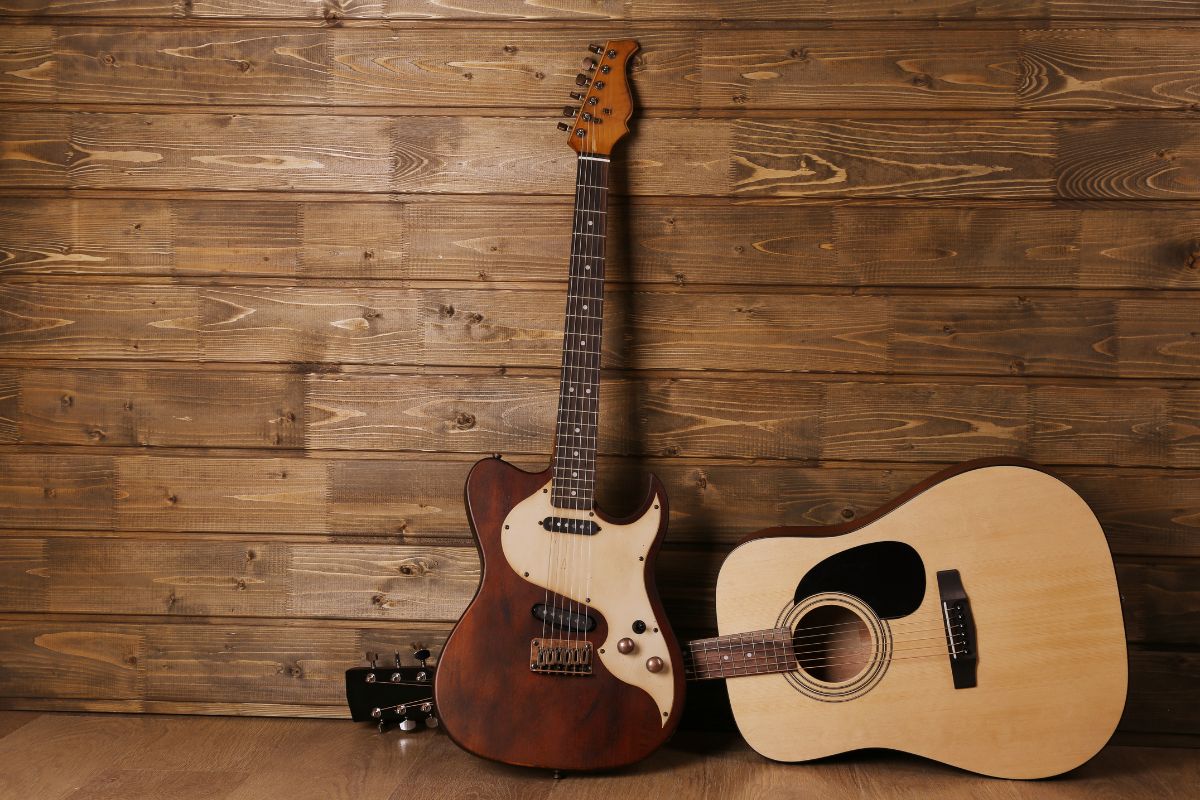
Whether you’ve played guitar before or are new to it, the guitar is an amazing instrument that can really add to your musical prowess. Usually, beginners start learning through an acoustic guitar and then transition to an electric guitar.
Ultimately, there’s no one-size-fits-all answer to whether you should start with an eclectic or acoustic guitar. It depends on your interests and goals as a future guitarist. Electric guitars are popular for their volume and tuning flexibility. Jazz musicians adopted them in the 1930s for louder performances than their acoustic counterparts.
Over the years, there have been many musicians who have changed how guitars are used. Everything can be interchanged to suit a specific style. So today we will break down the similarities and differences between these two types of guitars and discuss which one is best overall.
What Are the Differences and Similarities
Similarities
These two types of guitar mostly have several similarities. They both have 6 strings that you can tune to your preferences. The standard tuning is EADGBE. However, many musicians tinker with this to make them sound to their preferences.
Apart from the fretboard’s width, both acoustic and electric guitars share the same fretboard, given they are of the same body size. Whether you’re playing rhythm or lead, they will easily handle every note and chord you wish to play.
The good news is that learning to play one type of guitar can help you lay a strong foundation for the other. Once you master the basics of playing either an eclectic or an acoustic.
Differences
Looking at the differences between acoustic and electric guitars can help you decide which type suits you best. Let’s begin by comparing the foundational and operational aspects of these instruments.
How Sound Is Projected
One major difference lies in how acoustic and electric guitars project sound. Acoustic guitars, being larger, have a hollow body with a central hole. The resonance of the hollow body amplifies the sound of strings, allowing you to play without additional equipment.
In contrast, electric guitars typically have a solid body and rely on pickups beneath the strings to convert vibrations into an electric signal, which is then amplified through a cable and an amplifier.
How They Look
Electric guitars offer a vast array of shapes, colors, and sounds, providing near-endless options. On the other hand, acoustic guitars have less variety in their appearance and sound.
Acoustic guitar come in the classic hollow-body Dreadnought shape. Other types include Parlor, Orchestra model, Grand Auditorium and Jumbo. Electric guitars on the other hand come in solid body, semi hollow or hollow bodies. Each type of body makes the tone coming out of the guitar sound either bright or warm.
Type of Strings
The type of strings used is a notable difference between acoustic and electric guitars. Acoustic guitars can use either nylon or steel strings, with nylon providing a softer sound. Electric guitars generally require steel strings, often with a lighter gauge, allowing for more flexibility in sound.
Weight
Acoustic guitars are bulkier, potentially impacting string spacing and height, making them challenging for beginners. They may require more hand strength due to thicker strings and neck. In contrast, electric guitars, with their smaller size and lighter strings, are often considered easier for beginners.
How They Sound
The sound difference is significant. Acoustic guitars maintain a consistent sound determined by the body, wood type, fretboard, and construction. Electric guitars have customizable sound, especially when connected to an amp allowing adjustments to bass and treble. The sound of an electric guitar can be further modified using effects pedals and different pickups.
Understanding these differences will help you make an informed choice between acoustic and electric guitars, considering factors like playing preferences, body size, and desired sound.
Which Is Easier To Play
Many people question whether the electric guitar is easier to play than the acoustic one. The reality is that it depends on what you want to play and how good you want it to sound. The fundamentals of both can be grasped rather swiftly.
For many, mastering the basics of the acoustic guitar is sufficient. Being able to play basic chords can take you a long way, especially if you also sing.
On the other hand, the electric guitar is typically favored for music with numerous individual notes. While you can play open chords on it, it excels in handling riffs and more intricate playing, which may require a bit more time to learn. Advancing beyond open chords also entails additional work on the picking hand.
It’s worth noting that there’s no limit to how advanced an acoustic guitar player can become. Listening to genres like flamenco, gypsy jazz, or classical guitar music reveals acoustic guitars achieving much more than just open chords. Ultimately, the choice between electric and acoustic depends on your musical preferences and the level of complexity you aim to achieve in your playing.
Which is More beginner Friendly
Choosing between an acoustic and an electric guitar for beginners involves weighing the pros and cons of each.
Acoustic Guitar
- Cost to Play: Acoustic guitars have a cost advantage as they don’t require an amplifier. Starting with an acoustic means you only need essential accessories, unlike an electric guitar which demands an additional amp.
- Focus on Basics: Playing acoustic helps beginners focus on the fundamentals without the distraction of distortion, pedals, or volume controls. It emphasizes the basics of the instrument, tone, and sound.
- Mobility and Accessibility: Acoustic guitars are highly mobile and easy to carry, making them convenient for travel, jam sessions, or impromptu performances. They are hassle-free in terms of flying or taking on a camping trip.
- Immediate Accessibility: Some players find the immediate accessibility of an acoustic guitar appealing. The simplicity of just picking it up, whether on a stand or in its case, encourages frequent playing.
Electric Guitar
- The simplicity of Playing: Electric guitars, when properly adjusted, tend to be more forgiving for beginners. They often have lower action, lighter strings, a smaller body, and a thinner neck, making it easier for beginners to fret notes and establish finger shapes.
- Volume Control: Contrary to common belief, electric guitars offer volume control. You can practice quietly with headphones, at low volume, or even unplugged, providing flexibility in controlling noise levels.
- Versatility in Sound: Electric guitars offer a broader range of sounds with various effects. The pickups and amplifiers enhance the learning process, and the versatility of sound can be inspiring for players interested in exploring different genres.
Which Is Best For You?

Between acoustic and electric guitars, your musical preferences and the sounds that resonate with you should be what help you decide. Ultimately, the best guitar for you is the one you already own because it allows you to start playing today. Let’s break down which guitar is best for which situation.
Acoustic guitars are ideal for those who enjoy a range of musical genres, including singer-songwriter, folk, country (and complement well with electric guitar), bluegrass, flamenco, and classical guitar. These guitars offer a warm and natural sound that resonates with the expressive nature of these styles.
On the other hand, if your musical preferences lean towards rock, metal, funk, jazz, blues, or indie, electric guitars are the go-to choice. Their ability to be amplified makes them well-suited for these genres, allowing you to explore a wide spectrum of tones and styles.
Remember, any instrument will be easy to play if mastered the right way. Having said that, both instruments can be used in almost all genres. As you become more familiar with playing the guitar, you’ll discover that there are more types of guitars than just acoustic and electric.
Your unique style will emerge based on what influences you, allowing you to create a musical expression that is entirely unique to you!
Conclusion
Choosing between acoustic and electric guitars depends on your personal preferences. We lean towards recommending an acoustic guitar, especially if you’re a beginner. They are very easy to approach. Electric guitars can be somewhat overwhelming initially due to their complexity, making acoustic guitars a simpler and less intimidating choice for those starting out.




